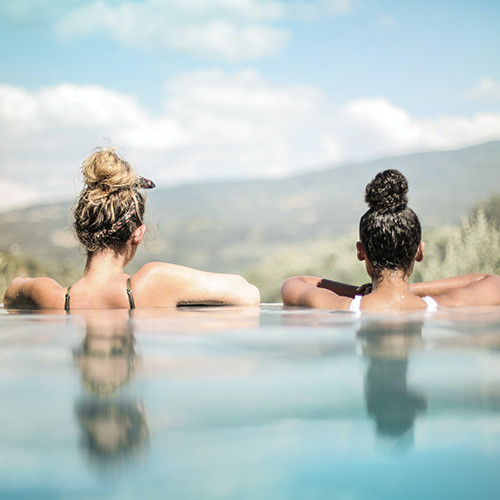Water Baby? Here's How to Protect Your Skin and Hair from Chlorine
Posted by Skin Elite on Oct 28th 2020
Cooling down and splashing around in the swimming pool feels great in the summer. That’s until you notice that your skin is dry and your hair is frazzled, or even green. Chlorine does an excellent job of killing bacteria in swimming pools, but unfortunately, the potent chemical can wreak havoc on your hair and skin.
Over time, the chemicals from chlorine can damage skin tissue and strands of hair. Chlorine strips the hair and skin of the natural oils that protect against damage and retain moisture. As a result, your lazy day floating around on an inflatable can leave your skin dry, itchy, flaky, and sensitive. Your hair and nails may become dry and brittle. Oops!
But don’t worry, we’re not going to suggest you skip a day at the pool. Here are some tried and tested ways to ward off – or at least lessen – chlorine’s adverse beauty effects.
Shower Before You Swim
Before you pop into the pool, be sure to have a rinse first. Both your skin and hair are less likely to soak in water from the pool if they’re already wet, so make sure you get a good drenching beforehand to boost resistance.
Sure, the skin is technically waterproof, but it can still absorb chemicals lurking in water sources. While showering won’t completely block out skin and hair irritation from chlorine, it certainly lowers the irritation risk.
Slather on the SPF
When it comes to protecting your skin before jumping in the pool, skip the specially formulated pre-swim lotions. They may reduce chlorine damage, but some skincare products can interact with chlorine to produce potentially carcinogenic by-products.
More importantly, some pre-swim lotions can make your sunscreen less effective. And none of us want to burn our delicate skin, do we?
Before swimming in the pool, be sure to slather on waterproof sunscreen around 15 minutes or so before. While it may not do much to defend your skin against chlorine, protection from the sun’s harmful rays is essential. After all, sun damage is the number one cause of premature aging. Consider choosing a thick sunscreen as it may work better as a barrier between your skin and chlorine.
There are many great sunscreens available to protect your skin, but one of our top choices is EltaMD's UV Sheer Broad Spectrum SPF 50+. Lightweight, nourishing, and hydrating it protects the skin without adding extra sheen and shine.
Lather Up
When you’re done with swimming laps (or splashing and frolicking around), rinse your skin and hair with fresh water as soon as possible.
Showering immediately after swimming in a chlorinated pool can reduce moisture loss by ensuring that the skin and hair don’t suffer from prolonged contact. Lather up your body with a mild shower gel, cream, or cleanser, and clean your hair with a gentle shampoo and conditioner. Be aware that while clarifying shampoos may balance the scalp’s pH after swimming, the acidity of some can stress the hair. Approach with caution.
It's always a great idea to keep some travel size body and hair care products with you while you're on-the-go. The Tuel Body Travel Kit is a perfect pool-time secret weapon. The kit includes a body wash, lotion and body serum to purify, moisturize and protect your skin anytime, especially after some pool time.
Remember to give your hair a good soak. A quick wash may be convenient, but it may allow some chlorine to linger in the hair follicles. Let the water flow through it for a good five minutes or so.
Moisturize
Even tap water is chlorinated to some degree. So, it’s essential to moisturize the skin following an after-pool shower. Reach for a lotion packed with ceramides and alpha hydroxy acid to hydrate your skin and restore its pH balance. Don’t just moisturize the face, either. Slather the cream onto every inch of your body, taking care of the cuticles around the nails where the skin is more delicate and susceptible to chlorine damage.
Another fabulous product is PCA Skin's HydraMatte. The formula has a gel consistency and is ideal for oily skin. It refreshes skin without adding any extra sheen or shine. Experience immediate and long-term hydration that reduces oil at the skin’s surface while minimizing the appearance of pores and fine lines.
Prevention is Key
As with most things, prevention is key. Minimize chlorine's damage by making sure you have healthy skin, hair, and nails before you hop into the pool.
Your nails become especially brittle and fragile when submerged in chlorinated water too often or for too long. To keep them in tip-top shape, consider wearing gloves when you do the dishes. That way, even if you do spend some time in the pool, they’re already in excellent condition.
Apply Conditioner or Hair Oil
Before jumping into the swimming pool, consider coating your locks with either a deep conditioner or natural oil (such as coconut oil) to keep them luscious and healthy. A barrier like a conditioner or oil creates a layer between your hair and the chlorine and other chemicals lurking in the pool. Plus, it helps nourish the hair follicles too.
But if you decide to go for oil, you should either swim in an indoor pool or bundle your hair into a cap. Otherwise, the oil may attract sun damage if you’re swimming outdoors.
Want more advice? Here’s how to soothe a sunburn.

